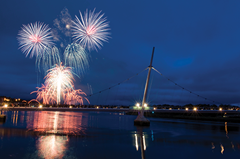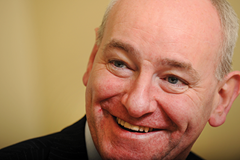City of Culture: Mark Durkan on a catalyst for change
 Derry’s year as UK City of Culture promises to be a catalyst for its creative industries and will boost local pride. Foyle MP Mark Durkan shares his hopes for 2013 with Peter Cheney.
Derry’s year as UK City of Culture promises to be a catalyst for its creative industries and will boost local pride. Foyle MP Mark Durkan shares his hopes for 2013 with Peter Cheney.
Playwright Brian Friel, as Mark Durkan recalls, spoke of Derry’s “Janus-like quality” and quipped that it looks into both states in Ireland and was unimpressed with either of them. Its MP prefers to say that it has traditionally been “outward-looking” as an emigration port and naval base and “looks to its past but it also looks forward.”
“It’s a city with a very interesting story and make-up, whether its recent history or its long-past history,” Durkan surmises. Derry’s City of Culture bid, in his opinion, had “a real pedigree to it.” Culturally, the city could offer integrity, richness and strong traditions but also “we didn’t pretend that it wasn’t a city that has experience of conflict and where there are still issues to be addressed.”
The ‘purposeful enquiry’ theme will explore the city’s history, and he expects this to be a dynamic and active part of the year. “Culture,” he notes, “isn’t just entertainment to be consumed but it’s about challenging ideas. It’s about presenting history and ideas in ways that people can take it in without thinking of it in terms of political hang-ups and troubles.”
“Real buy-in from across the community” also helped. The idea was pioneered in January 2009 by Westminster’s Culture, Media and Sport Secretary Andy Burnham. Sinn Féin initially refused to support a UK City of Culture while unionists claimed that there was “not enough UK” in the bid. However, all the council’s political parties came round to backing the campaign, which resulted in Derry’s win in July 2010.
Derry’s place on the global tourism map was marked in October, when the Lonely Planet guide ranked it as the world’s fourth best city to visit in 2013, ahead of Beijing or Montreal. “It has given us a different selling point, a different narrative,” Durkan comments.
In the House of Commons, Durkan has taken queries from MPs across Great Britain, whose local councils are hoping to bring home the next City of Culture award in 2017. Those cities include Aberdeen, Durham and Plymouth which lost out to Derry but will now have a longer lead-in time for their new bids.
Some enquirers have put Derry on an even bigger stage. “It isn’t actually European Capital of Culture,” Durkan laughs. “It isn’t that but we are going to do it as though we were.”
He had his tickets for Homegrown 2013 in the Millennium Forum that night, featuring Paddy Nash who had “the best song about the current financial crisis” with ‘The Moneyman’s Dead’ on his ‘Times of Transition’ album.
Other highlights included the Sons & Daughters concert (a “great showcase” for the city), the all-island Fleadh in August, the Lumiere festival organised by lighting designers in November, and the re-enactment of the return of St Columba in June.
 “I think it will help to reinforce a lot of the positive work that people have been doing to try to promote and market the city,” Durkan predicts. “Winning a very significant status brand like the first UK City of Culture really helps to do that.”
“I think it will help to reinforce a lot of the positive work that people have been doing to try to promote and market the city,” Durkan predicts. “Winning a very significant status brand like the first UK City of Culture really helps to do that.”
He adds: “It also allows people in the city at large to see their own city in a more positive light than much of the coverage of the past decades has maybe allowed them to.”
The creative sector is broader than traditional art forms and the Digital Derry project wants to see 100 digital companies created and sustained in the city over the next five years. All of this work is spurred on by the City of Culture: “You’re going to see ideas being inspired, and often innovation is ideas bouncing off problems and seeing how things can be changed and transformed.”
This is an optimistic time for the city but the difficulties that it faces cannot be ignored. 8.6 per cent of Derry’s workforce is on the dole and 39.5 per cent of the working age population is economically inactive. The equivalent rates for the whole of Northern Ireland are 5.5 per cent and 33.8 per cent respectively.
“It’s a city that has big challenges,” Durkan admits. “While Derry has many unique attributes, it is not immune from any of the economic challenges that are facing all other cities and regions. It’s a city that obviously still has very high unemployment and high rates of economic inactivity.”
Welfare reform is “going to bite” and affect the spending power of the city’s residents, which makes the need for job creation all the more important.
“We need to be making and selling things from the city as well as selling the city itself,” he states. “The City of Culture opportunity isn’t, of itself, the answer to all those problems but it helps us all to move forward and address them, so it gives us a platform. The problems aren’t all behind us. The opportunities are all ahead of us.”





